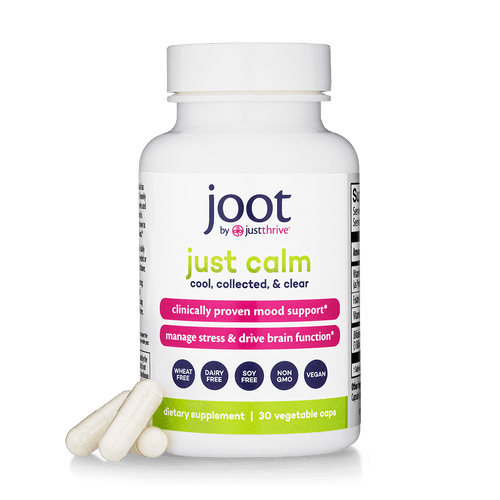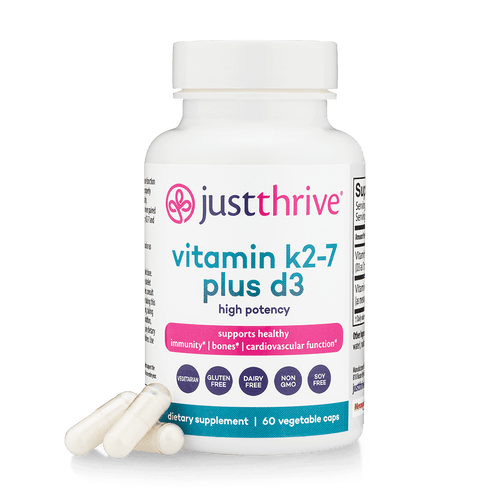Could your gut be to blame?
Do you feel tired practically all the time? And not just regular tired, like you had an extra busy day.
But a bone-deep weariness that leaves you feeling drained and dog-tired even when you’ve gotten a full night’s sleep?
That chronic fatigue is an alarm signal from your body. It’s more than needing sleep. It’s needing energy… and not from caffeine or power drinks. You can’t just push through this kind of fatigue. That will just make you feel worse.
So pay attention to that alarm.
Because it’s coming from a very surprising source.
Chronic Fatigue Is More Than Being Tired
Chronic fatigue isn’t just about being tired all the time. It affects your whole body.
Your muscles and joints may feel weak and achy. Your brain may feel foggy and overwhelmed.
You may feel depressed or irritable.
And even getting solid sleep doesn’t help.
Every cell in your body feels drained. And that’s where you’ll need to start to revitalize—at the cellular level.

Energy Starts in Your Cells
Every cell in your body contains its own miniature “power plants” called mitochondria.[1]
Your mitochondria convert glucose and oxygen into energy. Then that energy gets stored in special molecules called ATP (Adenosine Triphosphate).[2] When the cell needs to use energy, the ATP releases it from storage.
But when even the smallest glitch occurs in this system, it can quickly deplete your vitality and motivation so you’re left feeling weak, sluggish, and tired.
So what takes energy offline? Some of the biggest culprits include:
- Everyday stress[3]
- Free radicals[4]
- Immune system reactions[5]
- Gut dysbiosis[6]
Unfortunately, you may be dealing with all of these at once. That’s not really surprising… because they’re all connected in some way to your gut microbiome.
How an Unbalanced Gut Microbiome Makes You Tired
Your gut microbiome contains trillions of bacteria including beneficial probiotics and harmful pathogens. In a healthy gut, probiotic bacteria vastly outnumber pathogens, keeping all systems—including energy production—running smoothly.
When your gut is out of balance, pathogens outnumber probiotics—a condition called dysbiosis.
Dysbiosis can drain your energy and vitality leaving you feeling exhausted and world weary. And stress is one of the biggest triggers for dysbiosis.
That’s why a two-step plan is the best way to combat fatigue: Manage your stress and balance your gut.

Step 1: Manage Stress to Restore Balance and Energy
You’re exposed to stressors all the time. That makes it hard for your body to calm down, keeping you trapped in a stress spiral. Stress affects your body in lots of ways, and that includes knocking your gut out of balance[7] and draining your mitochondria.[8]
When your body can’t remember how to deal with stress effectively, it needs a reminder. And that’s where a unique probiotic can help.
Meet Bifidobacterium longum 1714™, a probiotic strain scientifically shown to help your body mount a healthy stress response. That means your body won’t get trapped in a stress spiral and can finally settle down. Once your body has a better handle on stress, you’ll be amazed by the shift in your energy… and B. longum 1714™ can help get you there.
Studies show that taking B. longum 1714™ consistently:
- promotes a healthy stress response[9]
- delivers a reduced sense of daily stress[9]
- supports healthy sleep quality and duration, even during stressful periods[10]
- promotes calmness and creativity[11]
And with natural stress management instructor B. longum 1714™ on board, you’ll feel refreshed and revitalized.
Step 2: Balance Your Gut for a Vitality Lift
Your gut microbiome is your body’s home base for everything. It affects every cell, organ, and system… from your immunity[12] to your sleep[13] to your motivation.[14] And it also plays a surprisingly large role in your daily energy levels.[15]
A diverse, well-balanced gut microbiome—where beneficial probiotic bacteria dominate—helps your body defeat energy thieves in several important ways:
- teaching your immune system not to under- or overreact[16]
- producing short chain fatty acids that protect mitochondria[17]
- promote your body’s ability to fight free radicals and cope with oxidative stress[18]
- shift your system into a more energy-positive state[19]
High-quality spore probiotics help ensure your gut stays in healthy balance. Spore probiotics have a unique protective endospore shell that allows them to survive stomach acid, the high temperatures of your digestive tract, and other biological hazards that would kill off other probiotics. So they get to your gut 100% alive and ready to get to work every time.
There are four clinically-proven spore probiotics known to provide balance and support a diverse population of beneficial bacteria in the gut microbiome.
- Bacillus indicus HU36™, a unique probiotic strain that produces powerful carotenoid antioxidants that keep free radicals under control… extra protection for mitochondria and energy production
- Bacillus subtilis HU58™, which supports a well-balanced, harmonious gut microbiome where diverse probiotic bacteria can flourish
- Bacillus coagulans, a powerful immune-supporting probiotic that produces L-lactic acid and helps you sidestep gas, bloating, diarrhea and constipation
- Bacillus clausii, the only strain known to resist damage from a variety of common antibiotics to support your beneficial bacteria when you need them most
With a diverse, well-balanced gut microbiome as your foundation, you’ll be celebrating a feeling of wellness and vitality.
Say Goodbye to Fatigue and Hello to Abundant Energy with Just Thrive
Ready to feel energized and brimming with vitality? Start taking proactive steps to expand your natural energy supplies so you can breeze through life’s challenges with plenty of get-up-and-go.
Your first steps…
Add Just Calm and Just Thrive Probiotic & Antioxidant into your daily routine.
Just Calm helps you turn down the volume on stress and turn up the volume on focused energy and vitality. Just Calm contains B. longum 1714™, the most heavily researched and scientifically-verified strain available, along with a focused combination of vitamins B6, B9, and B12. Just Calm supports easy stress management while promoting a positive mental outlook and overall feelings of well-being.
Just Thrive Probiotic & Antioxidant promotes a wide variety of probiotic bacteria that can grow and flourish to deliver plentiful health benefits. Just Thrive Probiotic contains four clinically-proven spore probiotics:
- Bacillus indicus HU36™
- Bacillus subtilis HU58™
- Bacillus coagulans (SC-208)
- Bacillus clausii (SC-109)
This proven successful squad of spore probiotics helps keep your gut microbiome in optimal balance to support abundant energy and overall wellness.
>> Try Just Calm and Just Thrive Probiotic today, and get ready to welcome energy, clarity, and vitality into your life.
Not sure Just Calm and Just Thrive Probiotic are right for you? We’re confident that you’ll notice a positive difference when you use them as directed, but if you’re not completely satisfied, we’ve got your back.
At Just Thrive we offer you total purchase protection, a 100% Bottom of the Bottle guarantee.
Love your Just Thrive purchase, or request a product refund at any time… Whether it’s 3 days, 3 weeks, or 3 months later… Even if the bottle is empty!
>> Try Just Calm and Just Thrive Probiotic, 100% RISK FREE, and save 30% on your first month’s subscription with code SUB30.
Sources
- Alberts B, Johnson A, Lewis J, et al. Molecular Biology of the Cell. 4th edition. New York: Garland Science; 2002. The Mitochondrion. Available from: https://www.ncbi.nlm.nih.gov/books/NBK26894/
- Bertram R, Gram Pedersen M, Luciani DS, Sherman A. A simplified model for mitochondrial ATP production. J Theor Biol. 2006 Dec 21;243(4):575-86.
- Picard M, McEwen BS. Psychological Stress and Mitochondria: A Systematic Review. Psychosom Med. 2018 Feb/Mar;80(2):141-153.
- Lee JS, Kim HG, Lee DS, Son CG. Oxidative Stress is a Convincing Contributor to Idiopathic Chronic Fatigue. Sci Rep. 2018;8(1):12890. Published 2018 Aug 27.
- Lorusso L, Mikhaylova SV, Capelli E, Ferrari D, Ngonga GK, Ricevuti G. Immunological aspects of chronic fatigue syndrome. Autoimmun Rev. 2009 Feb;8(4):287-91.
- Farhadfar N, et al. Gut Microbiota Dysbiosis Associated with Persistent Fatigue in Hematopoietic Cell Transplantation Survivors. Transplant Cell Ther. 2021 Jun;27(6):498.e1-498.e8.
- Madison A, Kiecolt-Glaser JK. Stress, depression, diet, and the gut microbiota: human-bacteria interactions at the core of psychoneuroimmunology and nutrition. Curr Opin Behav Sci. 2019 Aug;28:105-110.
- Picard M, McEwen BS. Psychological Stress and Mitochondria: A Systematic Review. Psychosom Med. 2018 Feb/Mar;80(2):141-153.
- Allen AP, Hutch W, Borre YE, Kennedy PJ, Temko A, Boylan G, Murphy E, Cryan JF, Dinan TG, Clarke G. Bifidobacterium longum 1714 as a translational psychobiotic: modulation of stress, electrophysiology and neurocognition in healthy volunteers. Transl Psychiatry. 2016 Nov 1;6(11):e939.
- Moloney GM, et al. Improvements in sleep indices during exam stress due to consumption of a Bifidobacterium longum. Brain Behav Immun Health. 2020 Nov 13;10:100174.
- Wang H, Braun C, Murphy EF, Enck P. Bifidobacterium longum 1714™ Strain Modulates Brain Activity of Healthy Volunteers During Social Stress. Am J Gastroenterol. 2019 Jul;114(7):1152-1162.
- Wiertsema SP, van Bergenhenegouwen J, Garssen J, Knippels LMJ. The Interplay between the Gut Microbiome and the Immune System in the Context of Infectious Diseases throughout Life and the Role of Nutrition in Optimizing Treatment Strategies. Nutrients. 2021 Mar 9;13(3):886.
- Smith RP, et al. Gut microbiome diversity is associated with sleep physiology in humans. PLoS One. 2019 Oct 7;14(10):e0222394.
- Dohnalová L, et al. A microbiome-dependent gut-brain pathway regulates motivation for exercise. Nature. 2022 Dec;612(7941):739-747. doi: 10.1038/s41586-022-05525-z. Epub 2022 Dec 14. PMID: 36517598.
- Wang, JH., Choi, Y., Lee, JS. et al. Clinical evidence of the link between gut microbiome and myalgic encephalomyelitis/chronic fatigue syndrome: a retrospective review. Eur J Med Res 29, 148 (2024).
- Wu HJ, Wu E. The role of gut microbiota in immune homeostasis and autoimmunity. Gut Microbes. 2012 Jan-Feb;3(1):4-14.
- Kunst C, Schmid S, Michalski M, Tümen D, Buttenschön J, Müller M, Gülow K. The Influence of Gut Microbiota on Oxidative Stress and the Immune System. Biomedicines. 2023 May 8;11(5):1388.
- Uchiyama J, Akiyama M, Hase K, Kumagai Y, Kim YG. Gut microbiota reinforce host antioxidant capacity via the generation of reactive sulfur species. Cell Rep. 2022 Mar 8;38(10):110479.
- Boolani A, et al. Trait Energy and Fatigue May Be Connected to Gut Bacteria among Young Physically Active Adults: An Exploratory Study. Nutrients. 2022 Jan 21;14(3):466.














